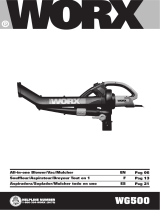
12A Electric Blower EN
32
PRODUCT SAFETY
WARNING: Some dust created by power
sanding, sawing, grinding, drilling and
other construction activities contains chemicals
known to the state of California to cause
cancer, birth defects or other reproductive
harm. Some examples of these chemicals are:
• Lead from lead-based paints;
• Crystalline silica from bricks and cement
and other masonry products;
• Arsenic and chromium from chemically-
treated lumber.
Your risk from these exposures varies,
depending on how often you do this type
of work. To reduce your exposure to these
chemical: work in a well ventilated area, and
work with approved safety equipment, such as
those dust masks that are specially designed
to filter out microscopic particles.
WARNING: This product can expose you to
chemicals including lead and Di(2-ethylhexyl)
phthalate (DEHP) which are known to the State of
California to cause cancer and birth defects or other
reproductive harm. For more information go to
www.P65Warnings.ca.gov.
Important Safety Instructions
WARNING: When using electric gardening
appliances, basic safety precautions should
always be followed to reduce the risk of fire, electric
shock, and personal injury, including the following:
WARNING: Read all instructions
FOR ALL APPLIANCES
1) Avoid Dangerous Environment - Don’t use
appliances in damp or wet locations.
2) Don’t Use In Rain.
3) Keep Children Away - All visitors should be kept
at a distance from work area.
4) Dress Properly - Do not wear loose clothing or
jewelry. They can be caught in moving parts.
Use of rubber gloves and substantial footwear
is recommended when working outdoors. Wear
protective hair covering to contain long hair.
5) Use Safety Glasses - Always use face or dust
mask if operation is dusty.
6) Use Right Appliance - Do not use appliance for
any job except that for which it is intended.
7) Ground Fault Circuit Interrupter (GFCI) protection
should be provided on the circuit(s) or outlet(s)
to be used for the gardening appliance.
Receptacles are available having built-in GFCI
protection and may be used for this measure of
safety.
8) Warning -To reduce the risk of electric shock,
use only with an extension cord intended for
outdoor use, such as an extension cord of cord
type SW-A, SOW-A, STW-A, STOW-A, SJW-A,
SJOW-A, SJTW-A or SJTOW-A.
9)
Extension Cord - Make sure your extension cord
is in good condition. When using an extension
cord, be sure to use one heavy enough to carry
the current your product will draw. An undersized
extension cord will cause a drop in line voltage
resulting in loss of power and overheating. Table
1 shows the correct size to use depending on
cord length and nameplate ampere rating. If in
doubt, use the next heavier gage. The smaller the
gage number, the heavier the cord. To reduce the
risk of disconnection of appliance cord from the
extension cord during operating:
i) Make a knot as shown in Figure 1; or
ii) Use one of the plug-receptacle retaining straps
or connectors described in this manual.
10) Avoid Unintentional Starting - Don’t carry
plugged-in appliance with finger on switch. Be
sure switch is off when plugging in.
11) Don’t Abuse Cord - Never carry appliance by
cord or yank it to disconnect from receptacle.
Keep cord from heat, oil, and sharp edges.
12) Don’t Force Appliance - It will do the job better
and with less likelihood of a risk of injury at the
rate for which it was designed.
13) Don’t Overreach - Keep proper footing and
balance at all times.
14) Stay Alert - Watch what you are doing. Use
common sense. Do not operate appliance when
you are tired.
15) Disconnect Appliance - Disconnect the appliance
from the power supply when not in use, before
servicing, when changing accessories such as
blades, and the like.
16)
Store Idle Appliances Indoors - When not in use,
appliances should be stored indoors in dry, and
high or locked-up place - out of reach of children.
17) Maintain Appliance With Care - Keep cutting
edge sharp and clean for best performance and
to reduce the risk of injury. Follow instructions
for lubricating and changing accessories. Inspect
appliance cord periodically, and if damaged,
have it repaired by an authorized service facility.
Inspect extension cords periodically and replace
if damaged. Keep handles dry, clean, and free
from oil and grease.
18)
Check Damaged Parts - Before further use of the
appliance, a guard or other part that is damaged
should be carefully checked to determine that it
will operate properly and perform its intended
function. Check for alignment of moving parts,
binding of moving parts, breakage of parts,
mounting, and any other condition that may
affect its operation. A guard or other part that
is damaged should be properly repaired or
replaced by an authorized service center unless
indicated elsewhere in this manual.









